Foreign
Wife of Haiti’s assassinated president indicted in his killing
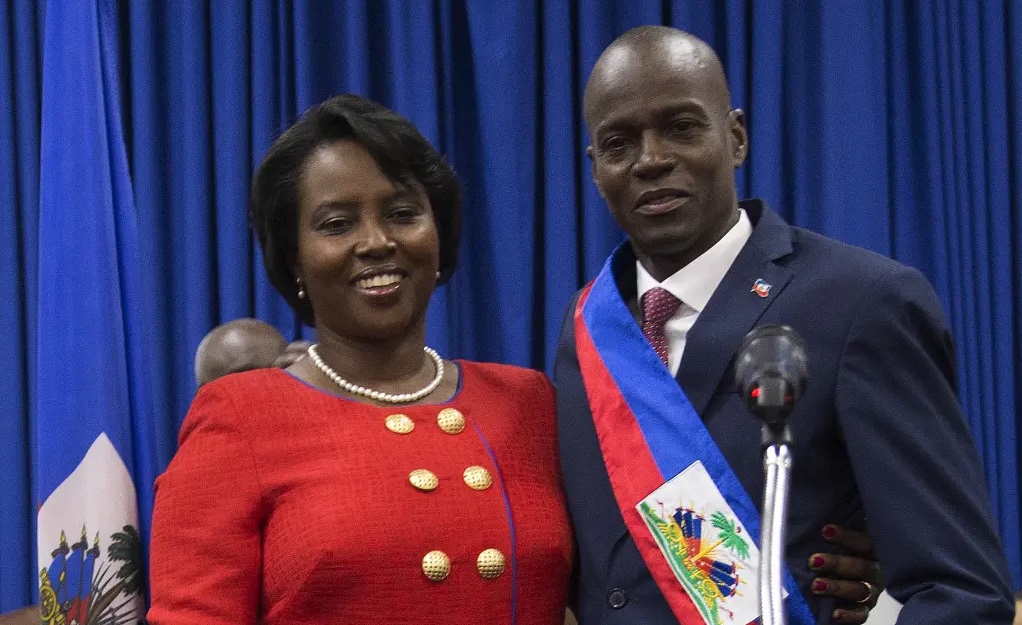
A judge in Haiti investigating the July 2021 assassination of President Jovenel Moïse indicted his widow, Martine Moïse, ex-prime minister Claude Joseph and the former chief of Haiti’s National Police, Léon Charles, among others in his killing.
Dozens of suspects were indicted in the 122-page report issued by Walther Wesser Voltaire, who is the fifth judge to lead the investigation after previous ones stepped down for various reasons, including fear of being killed.
Charles, who was police chief when Moïse was killed and now serves as Haiti’s permanent representative to the Organization of the American States, faces the most serious charges: murder; attempted murder; possession and illegal carrying of weapons; conspiracy against the internal security of the state; and criminal association.
Meanwhile, Joseph and Martine Moïse, who was injured in the attack, are accused of complicity and criminal association.
Joseph, the former prime minister, shared a statement with The Associated Press accusing Henry of “undermining” the investigation and benefitting from the president’s death.
“Henry … is weaponizing the Haitian justice system, prosecuting political opponents like me. It’s a classic coup d’état,” Joseph said. “They failed to kill me and Martine Moïse on July 7th 2021, now they are using the Haitian justice system to advance their Machiavellian agenda.”
Joseph again called on Henry to resign and noted that while he was still prime minister, he invited the FBI to help local authorities investigate the killing and wrote the U.N. and OAS for help.
“I won’t stop my fight. Justice must be served,” he said.
In his report, the judge noted that the former secretary general of the National Palace, Lyonel Valbrun, told authorities that he received “strong pressure” from Martine Moïse to put the president’s office at the disposal of Joseph because he needed it to “organize a council of ministers.”
Valbrun also said that two days before her husband was killed, Martine Moïse visited the National Palace and spent nearly five hours, from 10 p.m. to 3 a.m., removing “a bunch of things.”
He said that two days after Jovenel Moïse was slain, Martine Moïse called to tell him that, “Jovenel didn’t do anything for us. You have to open the office. The president told Ti Klod to create a council of ministers; he will hold elections in three months so I can become president, now we will have power.”
While the document did not identify Ti Klod, the former prime minister, Claude Joseph, is known by that name.
The judge also stated in his report that Martine Moïse “suggested” she took refuge under the marital bed to protect herself from the attackers, but he noted that authorities at the scene found that not “even a giant rat…whose size measures between 35 and 45 centimeters” could fit under the bed.
The judge said the former first lady’s statements were “so tainted with contradictions that they leave something to be desired and discredit her.”
Others who face charges including murder are Christian Emmanuel Sanon, a Haitian-American pastor who visualized himself as Haiti’s next president and said he thought Moïse was only going to be arrested; Joseph Vincent, a Haitian-American and former informant for the U.S. Drug Enforcement Administration; Dimitri Hérard, presidential security chief; John Joël Joseph, a former Haitian senator; and Windelle Coq, a Haitian judge whom authorities say is a fugitive.
Sanon, Vincent, and Joseph were extradited to the U.S., where a total of 11 suspects face federal charges in the slaying of Haiti’s president. At least three of them already have been sentenced.
Meanwhile, more than 40 suspects are languishing in prison in Haiti awaiting trial, although it was not immediately clear how quickly one would be held following Monday’s indictments. Among them are 20 former Colombian soldiers.
Milena Carmona, wife of Jheyner Alberto Carmona Flórez, told The Associated Press that he is innocent.
“What’s happening is that this crime is a conspiracy of great magnitudes in which powerful people are behind the scenes running everything, and that’s why they’re not given freedom,” she said of the former soldiers.
U.S. prosecutors have described it as a plot hatched in both Haiti and Florida to hire mercenaries to kidnap or kill Moïse, who was 53 when he was slain at his private home near the Haitian capital of Port-au-Prince.
The attack began late July 6 and ended July 7, according to witnesses.
Martine Moïse and others who were interrogated said they heard heavy gunfire starting around 1 a.m. that lasted between 30 to to 45 minutes before armed men burst into the bedroom of the presidential couple.
Moïse said she was lying on the ground when she heard the attackers yell, “That’s not it! That’s not it! That’s not it!”
She said the suspects made a video call to identify the exact location of what they were searching as they killed the president. She added that she was face down when the suspects tilted her head and tugged on one of her toes “to ensure that she wasn’t alive.”
Once they left, Moïse said she dragged herself on the ground and whispered to her husband that she was going to try and go to the hospital.
“That’s when she noticed that the president was dead and that his left eye had been removed from the socket,” the report stated.
Moïse said a group of about 30 to 50 police officers were supposed to guard the presidential residence, but the judge noted that only a handful of officers were present that night.
One officer told the judge that he heard explosions and a voice through a megaphone saying, “Do not shoot! It’s a DEA operation! US Army! We know how many officers are inside. Exit with two hands lowered.”
Another officer said the head of security of the first lady found her “in critical condition” surrounded by her two children. He said he also saw an undetermined number of people coming out of the president’s residence “with briefcases and several envelopes in their possession.”
The report quotes Inspector General André Vladimir Paraison saying that the president called him at 1:46 a.m. and told him, “Paraison! Man, hurry up! I’m in trouble! Come quickly and save my life.” He said he encountered heavily armed men and couldn’t access the residence immediately.
Officers at the scene said they found cars, windows, and doors at the president’s private home riddled with bullet holes, along with surveillance cameras cut off and a broken lock on the double-wooden door leading to the presidential bedroom.
The judge said some police officers at the residence were disarmed and handcuffed, while others “had time to throw themselves down a ravine” for safety. In addition, the police officer overseeing presidential security was accused of receiving $80,000 to bribe certain officers “to remain inactive” during the assassination, according to the report.
The judge noted how “none of the police providing security to the head of state was in danger. Unfortunately, the head of state was assassinated with ease.”
Foreign
US Supreme Court Allows Trump’s Ban On Trans Troops To Take Effect

A divided US Supreme Court on Tuesday allowed President Donald Trump’s ban on transgender military personnel to take effect while litigation plays out, putting thousands of troops at risk of dismissal.
The ruling — which the court’s three liberal justices opposed — is a significant victory for Trump, who has made rolling back transgender rights a major part of his second term in office, and has railed against judges who blocked parts of his agenda.
Lambda Legal and the Human Rights Campaign Foundation — which filed the lawsuit that had resulted in a lower court temporarily blocking the implementation of the ban — slammed the Supreme Court’s decision.
The ruling “is a devastating blow to transgender servicemembers who have demonstrated their capabilities and commitment to our nation’s defense,” the organizations said in a statement .
“Transgender individuals meet the same standards and demonstrate the same values as all who serve. We remain steadfast in our belief that this ban violates constitutional guarantees of equal protection and will ultimately be struck down,” they said.
White House Press Secretary Karoline Leavitt hailed the ruling as “another MASSIVE victory in the Supreme Court,” saying in a post on X that Trump and Pentagon chief Pete Hegseth “are restoring a military that is focused on readiness and lethality — not DEI or woke gender ideology.”
Hegseth meanwhile responded to the news with a post on his personal X account that said: “No More Trans @ DoD.”
In a January 27 executive order, Trump stated that “expressing a false ‘gender identity’ divergent from an individual’s sex cannot satisfy the rigorous standards necessary for military service.”
Shifting policies
The Pentagon followed that up with a memo issued in late February stating that it would remove transgender troops from the military unless they obtain a waiver on a case-by-case basis, as well as prevent transgender people from joining.
The Supreme Court’s decision to allow the ban to take effect means thousands of currently serving troops could be removed from the ranks.
The restrictions in the Pentagon memo are aimed at those who have been diagnosed with gender dysphoria — of whom there were 4,240 serving in the military as of late last year, according to a senior defense official — as well as those who have a history of the condition or exhibit symptoms of it.
Transgender Americans have faced a roller coaster of changing policies on military service in recent years, with Democratic administrations seeking to permit them to serve openly, while Trump has sought to keep them out of the ranks.
The US military lifted a ban on transgender troops in 2016, during Democrat Barack Obama’s second term as president.
Under that policy, trans troops already serving were permitted to do so openly, and transgender recruits were set to start being accepted by July 1, 2017.
But the first Trump administration postponed that date to 2018 before deciding to reverse the policy entirely.
Trump’s restrictions on transgender military service — which underwent changes in response to various legal challenges — eventually came into force in April 2019 following a protracted legal battle that went all the way to the nation’s top court.
His Democratic successor Joe Biden moved to reverse the restrictions just days after he took office in 2021, but Trump was reelected last year after making clear he would again seek to target transgender rights.
Transgender issues have roiled US politics in recent years, as states controlled by Democrats and Republicans have moved in opposite directions on policies ranging from medical treatment to what books on the topic are allowed in public or school libraries.
AFP
Foreign
2 Dead, Many Injured As Plane Crashes In USA

A small plane has crashed into a backyard of a residential neighbourhood in southern California, killing two people onboard and damaging homes, local authorities said.
The Ventura County Fire Department said firefighters received reports Saturday afternoon of a single-engine aircraft that had crashed into two houses in Simi Valley, northwest of Los Angeles.
Police and the medical examiner’s office “verified there were two passengers in the aircraft, both of whom were fatally injured in the accident,” the county fire department wrote on X.
The two homes were occupied at the time of the crash, but no injuries to residents were reported, the fire department said.
Photo and video images posted by the department showed firefighters on top of a house with holes in the roof, a fence and brick wall between residences knocked down, and the tops of trees sheared off.
The Simi Valley Police Department said officers had located the plane “in the backyard of a residence.”
Police told CBS News that the pilot, a passenger, and a dog were aboard when the plane crashed at around 2:00 pm.
The Federal Aviation Administration said, according to CBS, that the plane was a Van’s RV-10, which had taken off from William J. Fox Airfield in Los Angeles County and was heading to Camarillo Airport in neighbouring Ventura County.
In January, a Van’s RV-10, a small plane with four seats, crashed into a commercial building near Fullerton Municipal Airport southeast of Los Angeles, killing at least two people and injuring 18 others.
AFP
Foreign
Kamala Harris blasts Trump’s “chaotic” presidency, privatisation push
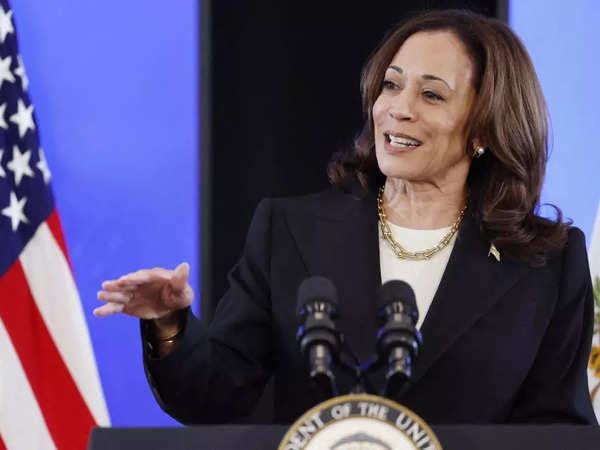
A former U.S. Vice President Kamala Harris has launched a critique of Donald Trump’s administration, accusing the former president and his allies of executing a decades-old conservative plan to reshape America through fear, division, and unchecked power.
Speaking on Wednesday in San Francisco at an event organized by Emerge; a political group dedicated to training Democratic women for public office, Harris delivered her first major address since her party’s defeat in the November election.
“What we are, in fact, witnessing is a high velocity event, where a vessel is being used for the swift implementation of an agenda that has been decades in the making,” Harris told the audience.
She argued that the chaotic and aggressive start to Trump’s presidency is not random but rather a calculated effort to serve a narrow group of elites.
“An agenda to slash public education. An agenda to shrink government and then privatize its services. All while giving tax breaks to the wealthiest,” she said.
Harris accused Trump’s administration of fostering a dangerous political climate.
She said, “A narrow, self-serving vision of America where they punish truth-tellers, favor loyalists, cash in on their power, and leave everyone to fend for themselves.”
Since taking office, Trump’s presidency has been defined by a flurry of executive orders, touching on immigration, foreign aid, and even everyday regulations such as water pressure in showerheads.
While his supporters have welcomed the rapid changes, critics warn the administration is bypassing democratic norms and institutions.
Recent opinion polls reflect growing public unease with Trump’s policies, particularly his shifting stance on tariffs and international trade, which have caused economic uncertainty.
Harris, who has largely kept a low profile since leaving Washington in January, used the platform to warn about the administration’s efforts to intimidate opposition voices.
“President Trump, his administration, and their allies are counting on the notion that fear can be contagious. They are counting on the notion that, if they can make some people afraid, it will have a chilling effect on others,” she said.
But she also struck a hopeful tone, saying resistance is growing across the country.
“Fear isn’t the only thing that’s contagious. Courage is contagious. The courage of all these Americans inspires me,” Harris told the crowd.
Though she has yet to confirm any future political ambitions, Harris is widely believed to be considering a run for governor of California in 2026 or even a White House bid in 2028.
Her forceful speech suggests she may be preparing to return to frontline politics, and positioning herself as a leading voice in the fight against Trump-era conservatism.
-
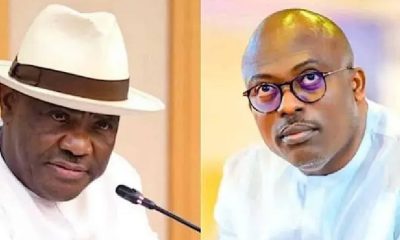
 Opinion23 hours ago
Opinion23 hours agoRIVERS, WIKE, FUBARA, AND THE WAY FORWARD
-

 Politics21 hours ago
Politics21 hours agoJust in: Delta PDP Reps members defect to APC
-
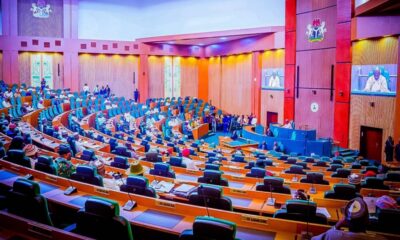
 News20 hours ago
News20 hours agoTension As Lawmakers Warns of Public Revolt Over Insecurity
-

 News24 hours ago
News24 hours agoCourt bans Nnamdi Kanu’s in-law from 3 proceedings over live streaming
-

 News2 hours ago
News2 hours agoReal cause of Herbert Wigwe’s helicopter crash revealed
-

 News19 hours ago
News19 hours agoEdo Speaker, Two Other Lawmakers, Formally Join APC
-
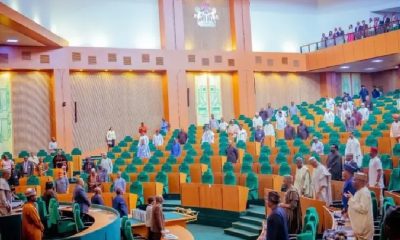
 News20 hours ago
News20 hours agoRep Raises Alarm After Deadly Attacks In Borno, Says Boko Haram Is Returning Stronger
-

 News8 hours ago
News8 hours agoTinubu presents N1.78 trillion FCT budget to NASS





